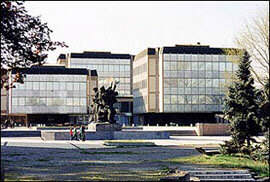 ORGANIZATION OF STATE AUTHORITY ORGANIZATION OF STATE AUTHORITY |

The Assembly of the Republic of Macedonia is a representative body of the citizens and the legislative power of the Republic. The Assembly consists of 120 Representatives. Representatives arc elected for a term of four years at general, direct and free elections by secret ballot. A Representative's mandate cannot be revoked.
The Assembly of the Republic of Macedonia adopts and changes the Constitution of the state. It also adopts laws and gives authentic interpretations of laws, determines public taxes and fees, adopts the budget of the Republic, ratifies international agreements and carries out political monitoring and supervision of the Government and other holders of public office responsible to the Assembly.
The first multi - party elections of Representatives to the Assembly of the Republic of Macedonia were held between November 11 and December 23, 1990. Seventeen political parties and 43 independent candidates took part. From the total number of 1,157 candidates, 120 Representatives were elected to the Republic's Assembly. The first multi - party Assembly of Macedonia was officially constituted on January 8,1991. The Assembly works in sessions which are open to the public.
 Structure of the Assembly after the parliamentary elections in 1998 Structure of the Assembly after the parliamentary elections in 1998 |
According to the party affilitation
VMRO-Democratic Party for Macedonian National Unity - 49 representatives; Social-Democratic Union of Macedonia - 27 representatives; Party for Democratic Prosperity - 14 representatives; Democratic Alternative - 13 representatives; Party for Democratic Prosperity of Albanians - People's Democratic Party - 11 representatives; Liberal - Democratic Party - 3 representatives; Socialist Party of Macedonia - 1 representative; Alliance of Romas of Macedonia - 1 representative.
According to ethnic origin
Macedonian - 92 representatives; Albanian - 25 representatives; Roma - 2 representatives; Bosniak - 1 representative.
The President of the Republic is elected at general and direct elections, by secret ballot, for a term of five years. A person may be elected President of the Republic twice at most. The President of the Republic must be a citizen of the Republic of Macedonia and be over the age of 40 on the day of election. A Presidential candidate can be nominated by a minimum of 10,000 voters or at least 30 Representatives, and can be elected President if he/she wins the majority of votes of the total number of voters. | The President of the Republic nominates a mandator to constitute the Government. He appoints ambassadors and other diplomatic representatives of the Republic of Macedonia abroad. The President of the Republic is Commander-in-Chief of the Armed Forces of Macedonia and President of the Security Council of the Republic. The President of the Republic of Macedonia is Boris Trajkovski. He has been a member of the Party VMRO-DPMNE since 1992. In the period 1992-1999, under the mandate of the President of the Party, he chaired the Party's Commitee on Foreign Policy.
The Government determines the policy of carrying out the laws and other regulations of the Assembly and is responsible for their execution. It proposes laws, the Republic's budget and other general acts adopted by the Assembly, and also adopts bylaws and other acts for the execution of laws. In accordance with the Constitution, the Government decides on the recognition of states and governments, as well as on the establishment of diplomatic and consular relations with other states. The actual Government of the Republic of Macedonia is a coalition government, including representatives of ethnic minorities. The Parties VMRO - DPMNE, DA and PDPA participate with their ministers in the Government. The actual President of the Government of the Republic of Macedonia is Ljubco Georgievski. He was one of the leading fugures in the breaking down of the then Yugoslav communist regime. At 25 years of age he became the Vice-President of the Republic of Macedonia. Eight months later he submitted the resignation to this office. Ljubco Georgievski is the President of the VMRO-DPMNE from its establishment until today.
Any political activity is prohibited within the bodies of the State Administration. There is also a provision that the bodies of the State administration in the areas of defense and the police must be headed by civilians.
The Supreme Court of Macedonia is the highest court in the Republic. It ensures uniformity in the implementation of the laws by the courts.
Emergency courts are constitutionally prohibited in the Republic of Macedonia.
Constitutionality and Legality in the Republic of Macedonia is protected by the Constitutional Court. Its judges, consisting of outstanding members of the Legal profession and with a term of office of nine years (without the right to reelection), are elected by the Republic's Assembly.
The citizens of Macedonia are guaranteed the right to have local governments. Local government is exercised through the municipalities, which are financed from their own sources as well as by funds from the Republic. In the units of local self-government, citizens participate in decision-making on issues of local relevance directly and through representatives, particularly in the fields of urban planning, communal activities, culture, sport, social security and child care, preschool education, primary education and basic health care. |

